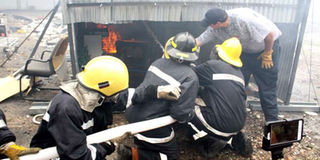Breaking News: At least 10 feared to have drowned in Makueni river
Disaster management should be prioritised in budget making, group says

Africa Fire Rescue Mission demonstrate how to put out fire. This was during the Missions training workshop for fire fighters at Jomo Kenyatta International Airport (JKIA) on November 19, 2015. PHOTO | ROBERT NGUGI | NATION MEDIA GROUP
What you need to know:
- Speaking in Nairobi after a weeklong training course on fire safety and prevention, a US based firm - Africa Fire Mission, said it is prudent for both national and county governments to set aside emergency funds to facilitate quick response in case of fire disasters.
- Mr Moore said that Counties should allocate more funds to the emergency response department as it’s a critical area just like the health and water department usually given the first priorities during budget making.
- Mr Mosby Galon, a fire captain with the US firm, said that there was need to have one or two unique toll free emergency numbers like 911 for all emergencies. This, he said, will help in addressing lapse in communication.
National and County governments have been urged to prioritise disaster management while allocating budgetary resources to effectively save lives and property.
Speaking in Nairobi after a weeklong training course on fire safety and prevention, a US based firm - Africa Fire Mission, said it is prudent for both national and county governments to set aside emergency funds to facilitate quick response in case of fire disasters.
The firm had partnered with Kenya Airports Authority (KAA) to conduct the week long exercise which ended on Friday.
Over 250 persons drawn from Kenya’s 47 counties, including KAA staff, participated in the training program conducted at Jomo Kenyatta International Airport (JKIA).
Speaking during the first All Kenyan Fire Academy, head of training, Ms Mary Gachohu emphasised the importance of training in fire rescue and prevention operations, stressing that this was in line with regulations by aviation authorities.
She said that since training in fire operations was expensive, partnerships with international companies like Africa Fire Mission were critical in reducing the cost of such training programs.
“We have invested heavily in fire equipment and machinery and our fire instructors are very well trained,” she said adding that fire training has always been a key priority for the authority.
Mr David Moore, the executive director of Africa Fire Rescue Mission, said that the growing population in Kenya seems to be outpacing the capacity of the emergency services.
“Fire destruction is one man’s job, fire prevention is every body’s job”, said Mr Moore.
He said the training is set to offer awareness to the community who try to put out fire with buckets of water and desperate determination as the emergency response take long to get to the scene.
In most of the cases, the firefighters are unable to get through narrow, crowded streets especially in Nairobi slums hence loss of life and destruction of property.
To effectively respond to emergencies like fire outbreaks, it was suggested that urgent measures be put in place by both the national and county governments.
Mr Moore said that Counties should allocate more funds to the emergency response department as it’s a critical area just like the health and water department usually given the first priorities during budget making.
“Every County should set aside emergency funds to have fire stations in a certain radius especially in disaster prone areas and have fire fighting equipment,” he said.
Mr Mosby Galon, a fire captain with the US firm, said that there was need to have one or two unique toll free emergency numbers like 911 for all emergencies. This, he said, will help in addressing lapse in communication.
Mr Galon said that the national government, county government and other stakeholders should have a well elaborate disaster response plan that applies even to the remotest residential areas.
He also advocated for massive and continued fire safety sensitisation through the media, roadshows and forums to share information on disaster preparedness and response.





